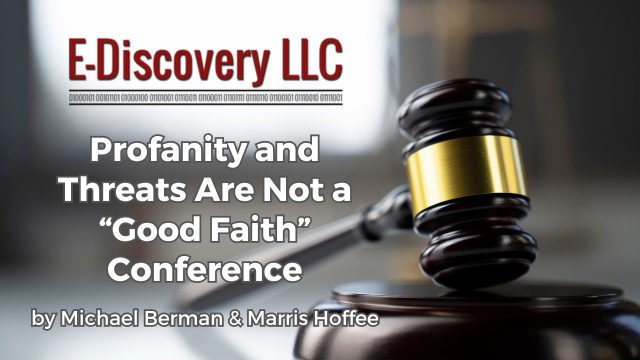
[EDRM Editor’s Note: The opinions and positions are those of Michael Berman and Marris Hoffee.]
Milne v. ProAll Int’l. Mfg., Inc., 2025 WL 1374124 (C.D. Cal. May 12, 2025), presents an unremarkable holding arising from remarkable facts.
Plaintiffs brought tort claims, including fraud, against Defendants and later filed a motion for discovery sanctions.
Under the court’s local rules, such motions require a good faith conference and other procedures before filing a discovery motion. As the court noted, “[c]ourts may deny discovery motions for failure to comply with the Local Rules’ requirements for such motions.” Id. at *2.
Plaintiffs asserted that they had engaged in adequate efforts, citing 15 emails, two Zoom conferences, and a proposed stipulation sent to Defendants. Nevertheless, the Milne court found that plaintiffs had not complied with the procedural requirements and denied the motion.
The court wrote:
At that final March 28, 2025 “zoom meeting,” Plaintiffs’ counsel directed “strong profanity” at counsel for Defendants while meeting and conferring about the subjects of the Motion…. Two of Defendants’ counsel submitted declarations attesting to the profanity by Plaintiffs’ counsel directed to Defendants’ counsel, including the words “f–king,” “bullsh—t,” and “God d—n”; counsel also attest that Plaintiffs’ counsel “yelled” at Defendants’ counsel and acted in an “aggressive” manner…. One of Defendants’ counsel further attests that Plaintiffs’ counsel issued threats to “triple the [settlement] demand” to make the suit impossible to settle if Defendants refused to comply with Plaintiffs’ counsel’s demands, telling one of Defendants’ counsel “I’m going to try this case because of you …. You pi–ed off the Plaintiffs’ lawyer …. You will pay for this.” …. Plaintiffs’ counsel concedes he used profanity, but denies he used the specific profanity or threats alleged by Defendants’ counsel….
Id. at *3.
On these facts, the court reached the unremarkable conclusion that: “Plaintiffs have violated both the letter and the spirit of L.R. 37-1 et. seq. in connection with the Motion.”
The court described Plaintiffs’ 60-page submission as “largely a rambling, often repetitive, at times disjointed presentation, filled with accusations of a ‘cover-up’ by Defendants and/or Defendants’ counsel,” followed by a listing of the allegations. Id. In its decision, the court wrote:
The Court finds none of the serious accusations set forth above made by Plaintiffs, to the extent they are levelled against Defendants’ counsel, are supported by the record.
Id. at *4.
In short, the Milne court wrote that “counsel for Plaintiffs came in, proverbially loaded for bear, and unleashed what he admits was ‘strong profanity’ directed to Defendants’ counsel….” It wrote that, “[c]onsidering the entire record, … [the] Court finds the Declarations of Defendants’ counsel credible as to the specific profanity used by Plaintiffs’ counsel as well as the description of alleged threats issued, as set forth above. Whatever else that meeting devolved into, it was not a ‘good faith effort to eliminate … as many of the disputes as possible.’ L.R. 37-1.” Id.
The court concluded:
Plaintiffs’ failure here to comply with L.R. 37-1, 37-1, and 37-2.2 was not a technical defect nor an oversight; rather, it was an intentional, tactical choice that sabotaged any chance for a good faith effort by both sides to attempt to resolve some or all of the issues raised in the Motion. Plaintiffs’ conduct resulted in a meeting of counsel that devolved into Plaintiffs’ counsel hurling profanity and threats at Defendants’ counsel. Plaintiffs violated both the letter and spirit of L.R. 37-1, et seq., and those violations warrant denial of the Motion.
Id. at *5.
Plaintiffs’ failure here to comply with L.R. 37-1, 37-1, and 37-2.2 was not a technical defect nor an oversight; rather, it was an intentional, tactical choice that sabotaged any chance for a good faith effort by both sides to attempt to resolve some or all of the issues raised in the Motion.
Milne v. ProAll Int’l. Mfg., Inc., 2025 WL 1374124, at *5 (C.D. Cal. May 12, 2025).
The court’s findings echo broader concerns about the decline of civility in litigation. The Hon. Steve Leben wrote about a law firm that advertised “that going against it in discovery matters would be like meeting Genghis Khan on the steps of the court house.” S. Leben, “We All Have a Role in Protecting Our Justice System: Promoting Procedural Fairness,” 46 ABA Litigation 6, 8 (2019). The advertisement was effectively used in a sanctions motion against that firm. Id. Judge Leben wrote that this is a “justice system” and “Parties want fair treatment—not an encounter with Genghis Khan. We owe them that much.” Id.
Similarly, The Sedona Conference has emphasized that “[o]ver-contentious discovery has outstripped any advantage in the face of ESI and the data deluge,” warning that advocacy must not be confused with adversarial conduct. See The Sedona Conference Cooperation Proclamation, 10 Sedona Conf. J. 331 (2009).The American Bar Association has also urged lawyers to embrace civility as a core ideal of professionalism. See J. Reardon, Civility as the Core of Professionalism (Sept. 2014). The Maryland Rules contain “Ideals of Professionalism”1 that affirm “professionalism requires civility in all dealings,” and “courtesy and respect should be demonstrated in all contexts….”
Milne illustrates that failure to engage in respectful, good faith advocacy can result in sanctions, denied motions, and reputational harm.
Notes
- Md. Attorneys’ Rules of Professional Conduct, Appendix 19-B. ↩︎
Assisted by GAI and LLM Technologies per EDRM GAI and LLM Policy.



